Winning Isn’t Everything—Jesus Is: Tony Dungy and Sam Acho
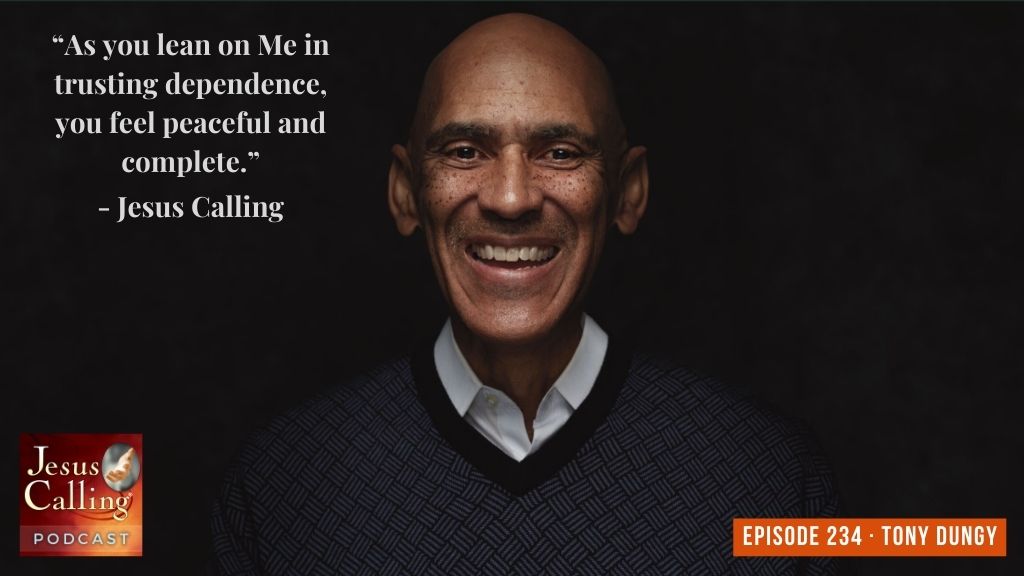
Tony Dungy: When I got to the Steelers, I was kind of shocked because growing up, I was focused on, I want to be a good player. I got to the highest level of the sport, and I saw all these Christian guys on the team, and that Christian walk was important to them. And it really kind of blew me away. It made me realize that what my mom said was true. It’s not what you do in life, it’s how you do it and who you’re doing it for. These guys were doing it for the Lord, and it made a big impact on me.
Winning Isn’t Everything—Jesus Is: Tony Dungy and Sam Acho – Episode #234
Narrator: The world tells us we need to be winning—whether it’s in our careers, in our hobbies, or being the best parent, grandparent, etc. Social media is laced with the best and brightest of our moments where “losing” doesn’t even seem like something we are allowed to acknowledge. One of the winningest coaches in the NFL, Coach Tony Dungy, and successful NFL linebacker Sam Acho have had their share of wins, but they also know doesn’t bring them what they most need in life—only Jesus can do that.
Coach Tony Dungy is known for his groundbreaking presence on the football field during his tenure as a player and as a coach, quietly pioneering his way through a 28-year career to become one of the winningest coaches in the NFL—the first coach ever to defeat all 32 NFL teams, and also the first African-American head coach to win a Super Bowl. But he is also known for holding his faith and his family first—even as he continued to collect accolades and establish “firsts” in the game of football. Now retired from the NFL, Tony has turned his attention to helping organizations like the national fatherhood program All Pro Dad and is prolific broadcaster for NFL games, all the while sharing the source of his winning ways—his unwavering commitment to Christ.
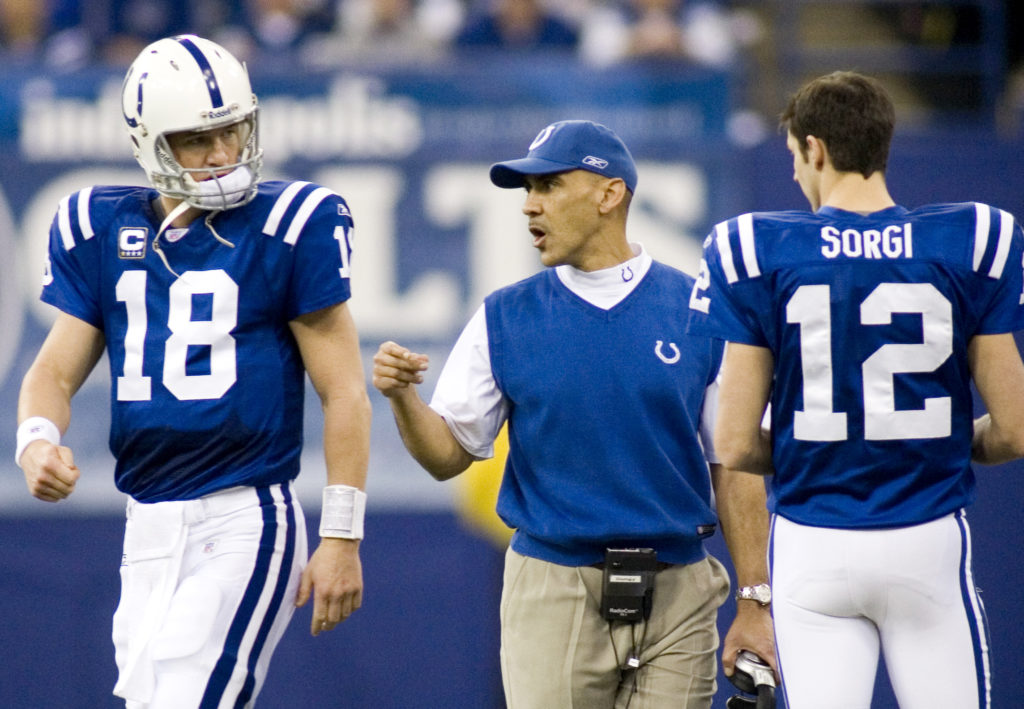
Tony Dungy: Hi, I’m Tony Dungy. I coached twenty-eight years in the National Football League. And for the past twelve years, I’ve been an analyst for NBC’s Football Night in America and Sunday Night Football. And I’m doing that and loving life. We have ten children, my wife, Lauren and I, and we live in Tampa, Florida.
Family Legacy Shapes a Young Man’s Path
I wouldn’t trade my upbringing for anything in the world. I grew up in a little small industrial town, Jackson, Michigan, and was in a beautiful family. My mom and dad were both teachers. My dad taught college biology and zoology. My mom was a high school English and public speaking teacher. My mom also doubled as the Sunday School teacher for our church. My grandfather was a minister, two of my uncles, my dad’s brothers, were ministers. So I grew up hearing about the Gospel from the time I can remember. And I can remember my mom [saying], as I was a little kid, “What would it profit a man to gain the whole world and forfeit his soul?” That’s the kind of upbringing I had. They also talked about doing things the right way and helping people.
So I accepted Christ as a really young boy. You know, “Hey, do you want to go to heaven?” “Absolutely.” I put my hand up. “What do I need to do?” And I can remember that very clearly. But like a lot of young boys at that time, sports kind of became my hero, or my idol. And of course, I had to be a good student so I could please my parents. So that became kind of my M.O. I’m going to be a good son. I’m going to be a good athlete. I’m going to try to go to college. A lot of my focus was on that.
And so all the way, I think through middle school and high school and even college, people wouldn’t necessarily say “Christian,” but they said “Nice guy, good kid, hard worker,” all of those things. But that changed for me when I went to the NFL.
Faith Training in The NFL
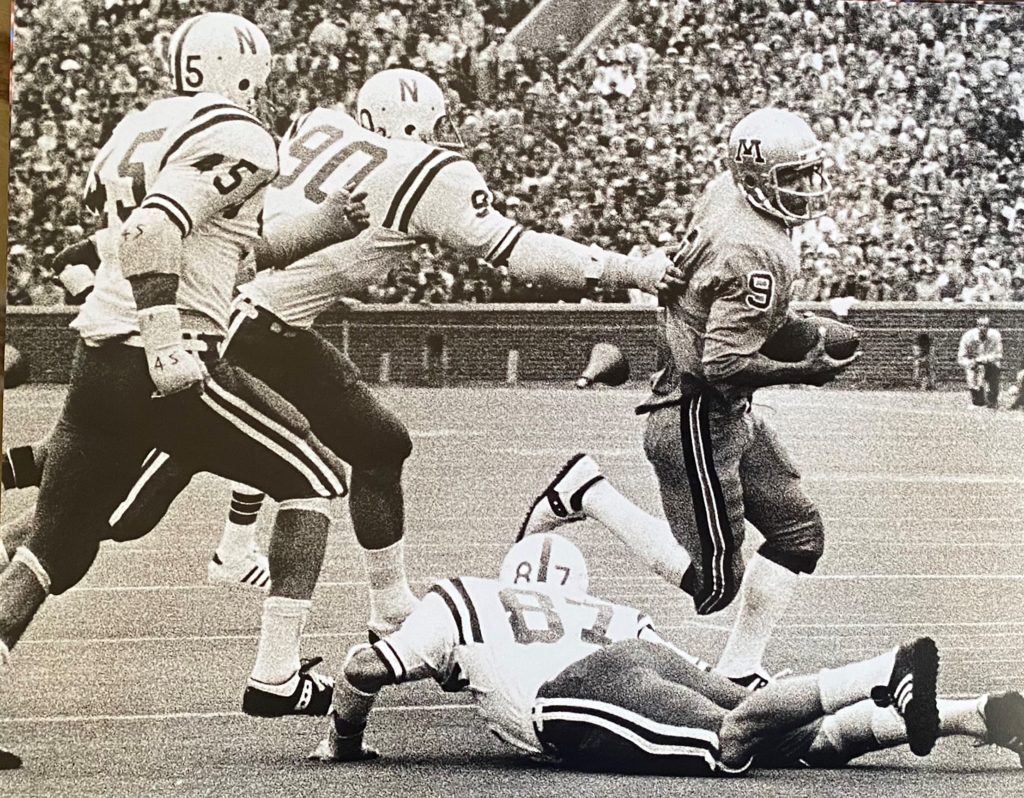
When I was young, I never thought about playing in the NFL. I just played because I liked it. Then I got to the University of Minnesota. I got a scholarship. I still didn’t think about professional football as a career. But then my senior year in college, I started thinking, Maybe I have a chance to do this. This is something I would enjoy, and maybe I’m going to be good enough.
Well, then when I did get to the Steelers, then I put my own plan into focus in my mind. Okay, I’ll play maybe ten years. I’ll win three or four Super Bowls. I’ll make enough money to start my own business. I’m a business administration major. I’ll have this nest egg and then I’ll live happily ever after. And it didn’t work that way.
I was twenty-one years old. I went to the Pittsburgh Steelers, and my coach there was a guy named Chuck Noll. And the first meeting we had, he welcomed everybody to the team, the new guys, and he said, “Welcome to the National Football League. You’re now getting paid to play football, so that makes it your profession. But please, please don’t make football your whole life.”
“Welcome to the National Football League. You’re now getting paid to play football, so that makes it your profession. But please, please don’t make football your whole life.” – Chuck Noll, to Tony Dungy
And I remember I was writing that down and thought, This sounds like my mother. It hit home to me that here was this man [who] had won two Super Bowls already, and he was saying, “Don’t make football your whole life.” And what Coach Noll said was true. You can’t pour everything into football.
After my third year, I’d been traded a couple of times, got released. I was twenty-five years old and basically done with my career. I didn’t know it at the time, but no other team was gonna call. And so I’m sitting there thinking, What am I gonna do now? I didn’t play long enough to get this nest egg. I’ve got to get a real job. What am I going to do? And the phone rang and it was Coach Noll calling and saying, “I think you have an aptitude for the game. You’re a good communicator. I think you could be a good coach if you would like. We’ll create an opening on our staff.”
And at that time, I think there were only ten African-American coaches in the entire National Football League, no head coaches and only ten assistants. So there weren’t a lot of role models. It wasn’t something I thought about. Looking back on it now, I know the Lord was preparing me, but that’s how I got into it. And it certainly wasn’t something that I thought I would do. But God, I think, had that plan. And I remember going to work the first day being there and just being so excited. This was something that I knew I could do well and I enjoyed. So God, I think, just had the right sense of timing for me.
Love God, Be Excellent
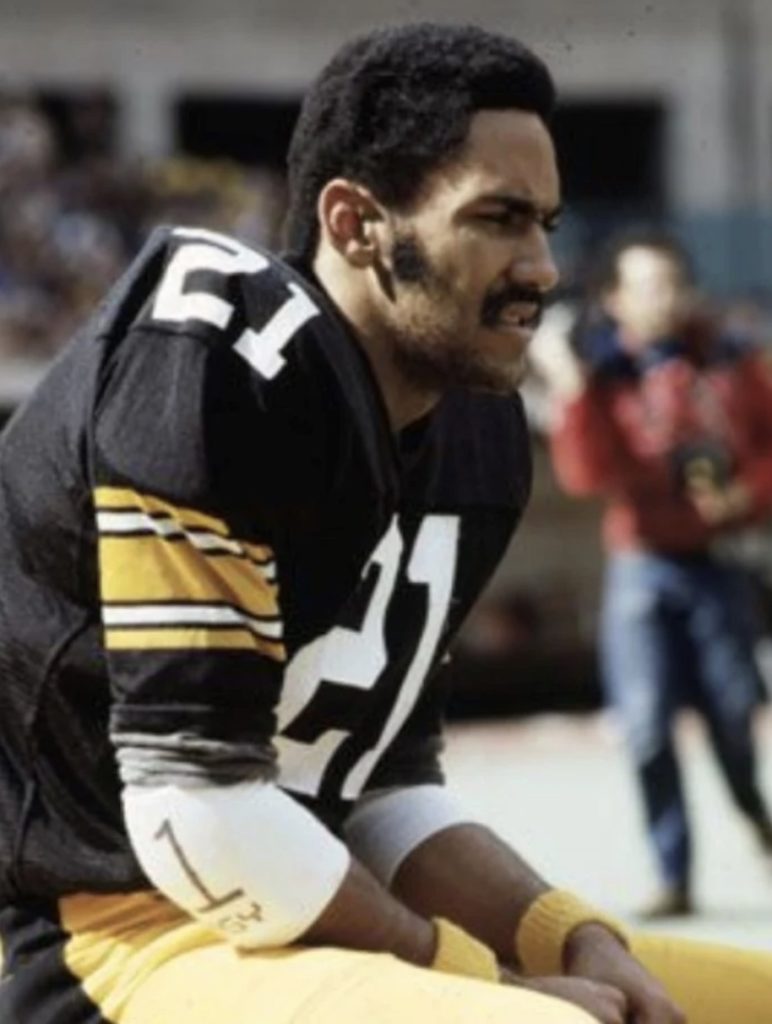
I think it was a real blessing for me to start with the Steelers organization, because Coach Noll had the right philosophy about how to do it and how to coach, and he transmitted that to all of us and he lived that. Many people say, “Oh, well, life should be about faith, family, and then your job.” But they don’t live that out—and he did. He made sure that we understood that family was important. He gave us time away. He was unlike many of the coaches that I could have worked for. He gave me that foundation of how you can do it and be successful and still honor the Lord. And so I was really, really blessed to have that.
Also, the thing that he did for me is he said, “Be yourself. I hired you because of what I saw in you. Don’t change. Don’t even try to be like him. Be yourself. Don’t worry about what anybody else says. You coach your way.” And the other thing he told me that was really important in my development—I had not really coached before. And I was very young, twenty-five. So I asked him the first day, “What am I supposed to do? What’s my job?”
And he said, “Your job as a coach, it’s very simple. Help your players be better.”
He meant that in all ways, not just on the field, not just better athletes, but to help them be better men. It was very simple: build relationships, get to know them, find out what they need, find out how you can help them and then deliver that. And so it wasn’t just, “Hey, one way to do it, my way or the highway,” but no, you’ve got to find out how you can help everybody be better.
Mentoring and Treating NFL Players With Respect
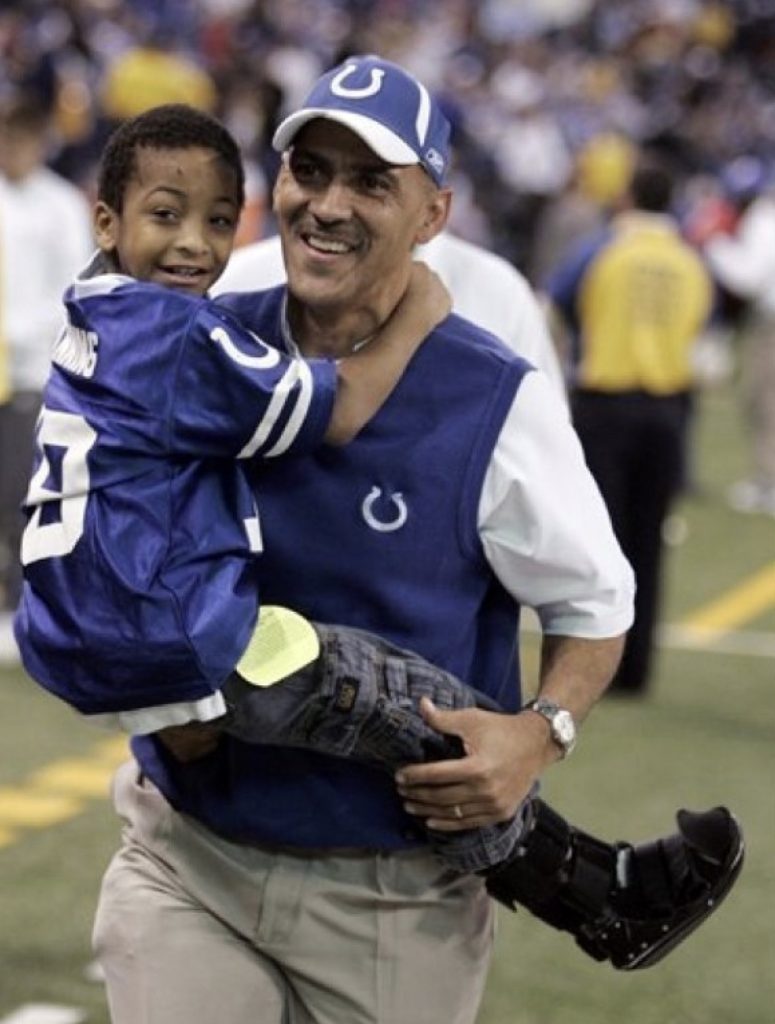
So that became my philosophy, that number one, faith and family were important. Yes, I was gonna coach and put a lot into it, but I wasn’t gonna neglect those two things. And then number two, I was gonna try to create an atmosphere—whether it was me coaching five individual players that I had, or a defensive unit, or eventually an entire team—I was gonna try to create that culture, that environment where we all worked together and we all tried to help each other be better.
And not everybody thought that was the best way to do it. It was maybe somewhat countercultural at the time. And then you add to the fact that once I let people know that I was a Christian, I felt I had to coach that way all the time. And again, that wasn’t necessarily the norm in the National Football League. And as I moved up the ladder, some people weren’t quite ready for that. “Well, we’ve never seen a coach who doesn’t yell, who use profanity. How are you going to motivate these guys? How are you going to keep them in line?” And I had to prove to people that you could do that and do it in a Christian manner. And that was fun in a lot of ways. But sometimes you felt like you were going against the grain a little bit. But I made a decision I was going to be different. And not everybody was ready for that.
“I made a decision I was going to be different. And not everybody was ready for that.” – Tony Dungy
I remember my first meeting with the Tampa Bay Buccaneers when I got the job in 1996 as the head coach. And I introduced myself and we talked about how we’re gonna do things. And I told the guys, “You know, you just need to know this: I’m a Christian. I’m going to coach you with respect. I’m going to be very demanding. But it’s probably going to be in a different way. I’m not going to yell at you, I hope, and I’m not going to use profanity. But let me just find out, is there anybody out there who needs that? Do you need me to yell at you and curse at you to play your best?” And I didn’t see any hands raised. So I said, “Okay. I think we can proceed then. Now, don’t tell me down the road that I’m not doing it the right way or the best way. You’ve all told me you don’t need that.”
Everybody kind of laughed and chuckled about it. And it took them awhile to get the feel of it. But after about three years, we had veteran guys telling the young guys, “Don’t mess this up. We’ve got a good coach here. We got a good thing going. Make sure you do the right thing. We want to play for him for a long time.”
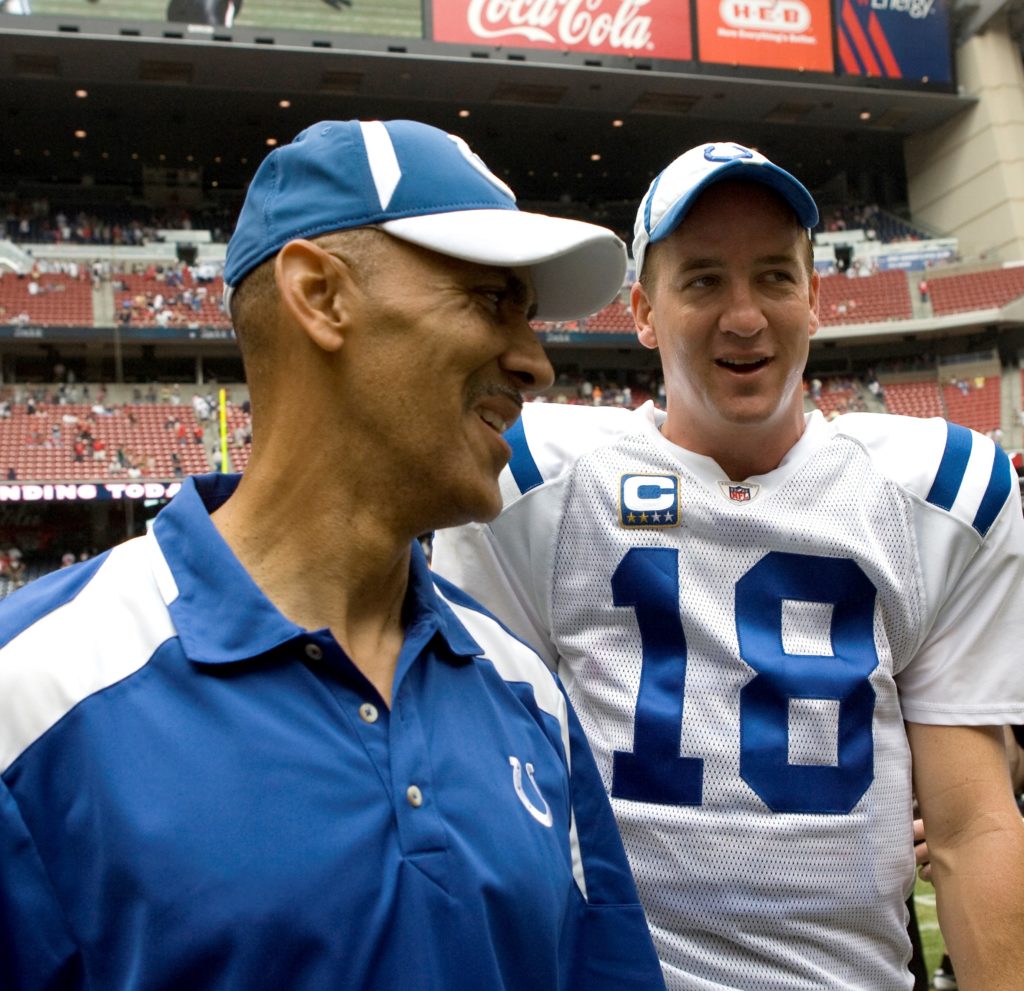
I wanted to help some young guys grow. And at that time, there weren’t a lot of African-American assistant coaches, and certainly not guys on the top level. So that became something that was a heart issue of mine. I wanted to help some young men maybe get their first step into the National Football League, but also help some guys grow as my mentors had helped me. So I was pretty intentional about that, about hiring young people with talent, but also empowering them, giving them positions, creating an assistant head coach position and kind of helping those guys get going.
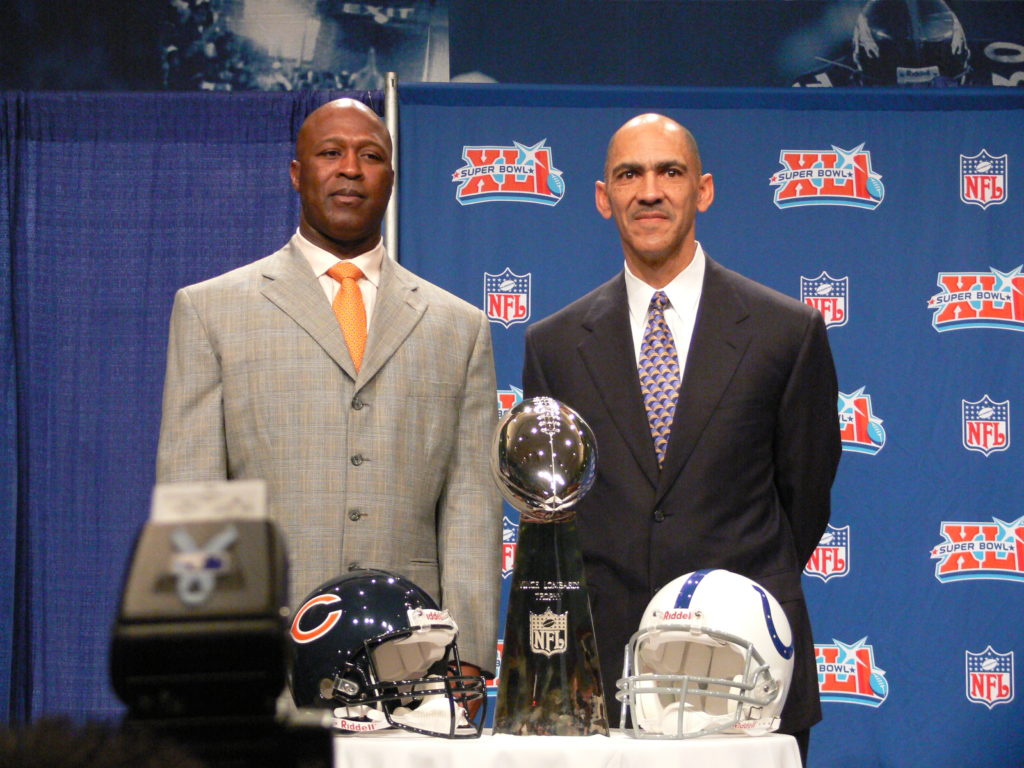
And so guys who ended up leaving our staff and going on—Herm Edwards coached the Jets and the Chiefs to the playoffs. Lovie Smith coached the Bears to the Super Bowl. Mike Tomlin coached the Steelers to the Super Bowl. They felt comfortable that they could do it that way and have family days at practice and not have to use profanity and still get the job done.
And to me, to see those guys go on and succeed and kind of carry that tradition on—Jim Caldwell took the Colts to the Super Bowl after I left—that has been an awesome feeling for me to have those guys show the world that, you know what? You can honor the Lord and you can be openly expressive about your faith and still be excellent. And I carried that on with me for the next twenty-eight years.
“You can honor the Lord and you can be openly expressive about your faith and still be excellent.” – Tony Dungy
Groundbreaking Coaching Legacy
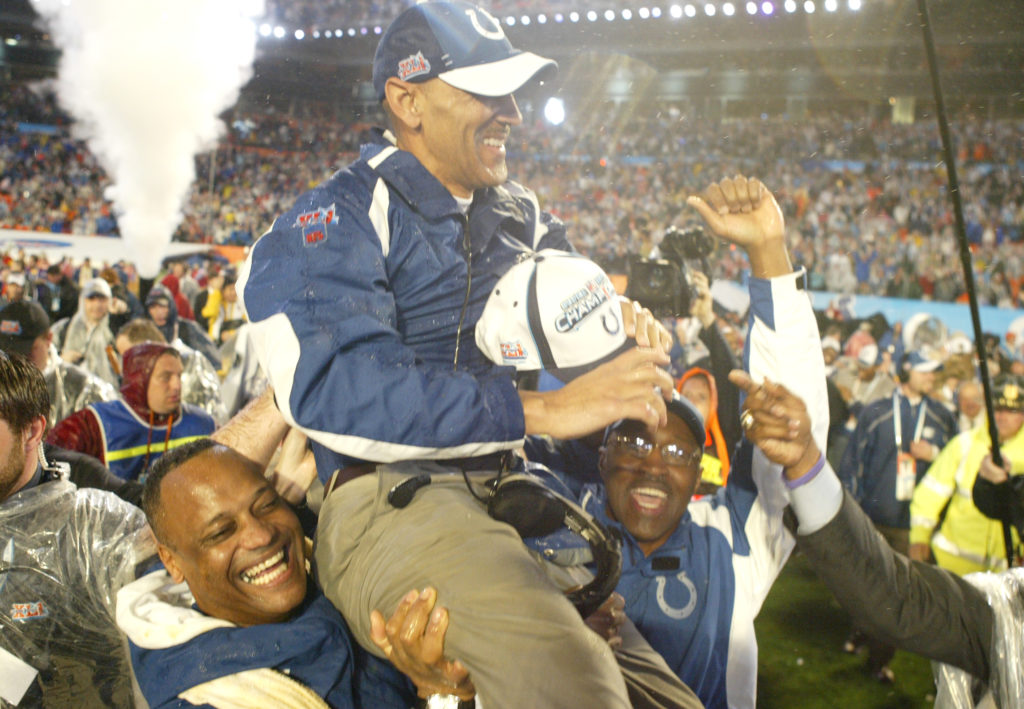
When I was young and I would dream about making it to the National Football League, you dream about being in the Super Bowl, scoring the winning touchdown. And I had some crazy dreams that way. But I never really dreamed about being a coach and I never dreamed some of the things that happened: being the first African-American coach to win a Super Bowl, going in the NFL Hall of Fame, meeting four presidents because you’re winning Super Bowls, I never, never thought about those kinds of things. But I think God just allowed it to happen, blessed me in a lot of ways, and some things that I can look back on now and say, “Wow, we won our Super Bowl in Indianapolis, and I was the first African-American coach to lead a Super Bowl team.”
My daughter was going to Spelman College. And she called me after the game and said one of her professors talked about it, that, “Hey, Jackie Robinson and Martin Luther King, this is what we were kind of looking for. And now your dad’s in that same category.” And I was like, “No, I’m not in the same category as Jackie Robinson and Martin Luther King.” But then you stop and think about it, well, twenty years from now, you know, it will be that kind of question. And it’s pretty amazing. I’m thankful. I’m grateful.
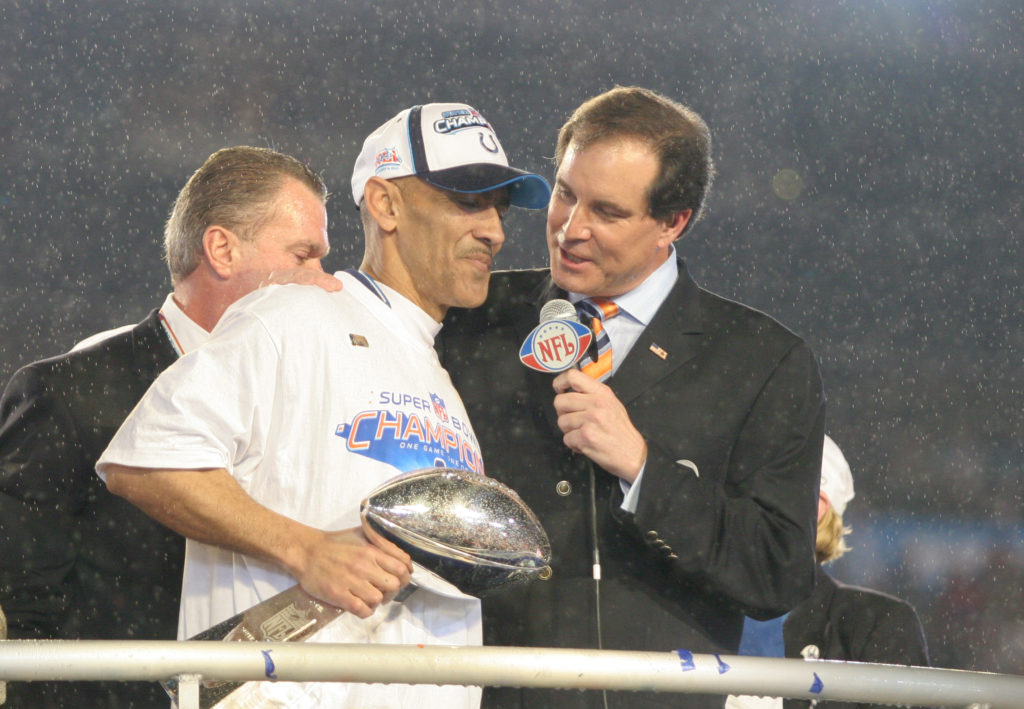
God takes you through things and you grow from them and then you look back and say, “Oh, that wasn’t that big a deal.” But at the time, it was monumental. God is giving you little trials to get you through, but you’re going to keep your focus on Him. I think the one thing that did happen to us, in 2005, we lost our son. And that’s something now that you say, “Gosh, can I handle this? Where is God? Am I still going to be faithful?” So even in that situation, my wife and I and our family could say, “Yeah, it hurts. But God’s still there and He’s got a reason for us to move forward and He’s gonna use us.”
“God takes you through things and you grow from them and then you look back and say, ‘Oh, that wasn’t that big a deal.’ But at the time, it was monumental. God is giving you little trials to get you through, but you’re going to keep your focus on Him.” – Tony Dungy
You know, we’re talking about the pandemic and everything was going on and people searching for answers, well, there’s a passage in Jesus Calling from July 17th, right as this pandemic was kind of taking root. And to me, it speaks of a lot of things that we could take and a lot of lessons right here in just one day’s reading. And it goes like this:
COME AWAY WITH ME for a while. The world, with its nonstop demands, can be put on hold. Most people put Me on hold, rationalizing that someday they will find time to focus on Me. But the longer people push Me into the background of their lives, the harder it is for them to find Me.
You live among people who glorify busyness; they have made time a tyrant that controls their lives. Even those who know Me as Savior tend to march to the tempo of the world. They have bought into the illusion that more is always better: more meetings, more programs, more activity.
I have called you to follow Me on a solitary path, making time alone with Me your highest priority and deepest Joy. It is a pathway largely unappreciated and often despised. However, you have chosen the better thing, which will never be taken away from you. Moreover, as you walk close to Me, I can bless others through you.
We think we’ve got to do all these things, go here, go there, I’ve got to take care of this. And God was just saying, “Stop. Stop for a minute and come to Me, put Me first, and everything else is gonna be okay.”
Telling the Truth Over the Air Waves
Television has given me a great platform to not only talk about the game and encourage people to watch, but it also gives me the ability to talk about other things. Right now, we’re certainly talking about social justice. We’re talking about communities and making communities better. So it’s giving me a great platform. But again, I think I can represent the Lord there in highlighting other people and helping America see some of the things that our players do that nobody really knew about. I can highlight their inner character, as well as tell people about the game on the field. I can take Christ to my job here as well.
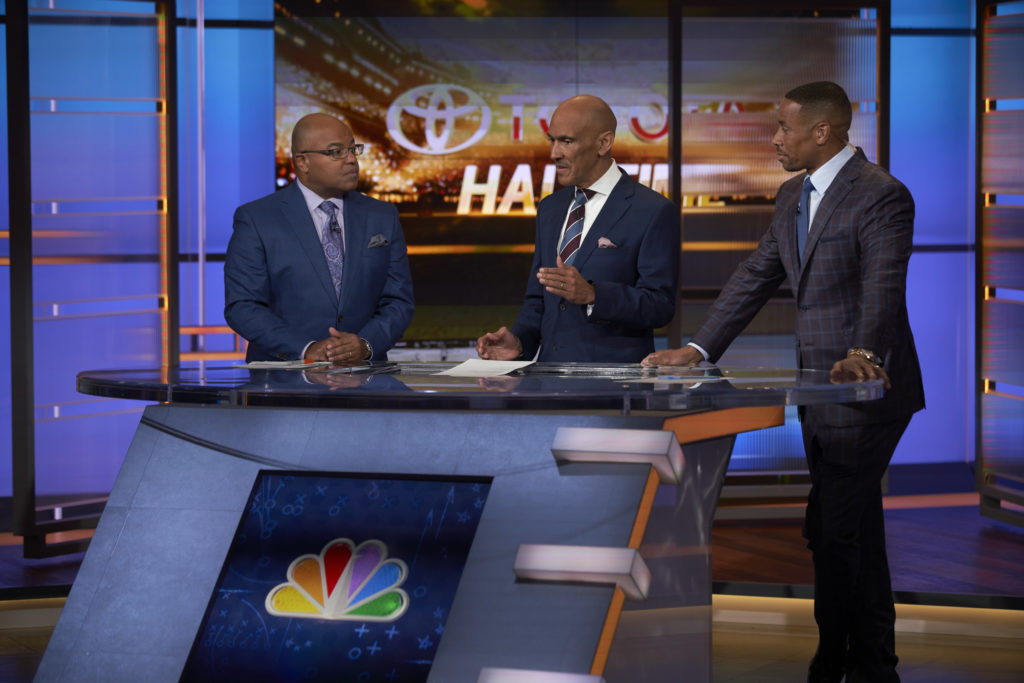
It’s not always what people want to hear, and I’ve gotten pushback on that. We broadcast the Super Bowl LII. The Philadelphia Eagles were playing the New England Patriots. And my job was to cover the Eagles that week. Nick Foles was their quarterback. It was a great story. He had replaced the starting quarterback and led Philadelphia to the Super Bowl. And I interviewed him, and he was just sharing with me his relationship with Christ and why he was playing and how he’s looking forward to the game.
I went on the pregame Super Bowl broadcast and I said, “I think Nick Foles is going to have a great game, because he really feels like God’s got him there for a reason. He’s relaxed. He’s relying on the Holy Spirit.” And man, people [said], “You shouldn’t talk about religion on the show. This is about sports and the Super Bowl.”
But I can with good conscience say I was doing my job, because that’s exactly what he said. He rewarded me by going out and becoming the MVP of the game and playing great football and giving honor to Jesus Christ after the game. But I just felt like God had me there right for that moment. And Christ is so much a part of my life that if I can just help steer someone else, anyone towards Jesus, it’s very important. Truth always wins. And we can’t be afraid of sharing the truth.
“Christ is so much a part of my life that if I can just help steer someone else, anyone towards Jesus, it’s very important. Truth always wins. And we can’t be afraid of sharing the truth.” – Tony Dungy
Narrator: To learn more about the work Coach Dungy does with non profit organizations, check out his social media platforms. You can also see him featured on the cover of the Winter 2021 Jesus Calling magazine. The Jesus Calling Magazine is available at most Books-A-Million Book Store locations or at Mardel Christian Stores. You can also visit JesusCalling.com/magazine to view the magazine digitally and find out how to subscribe.
Stay tuned to our conversation with NFL linebacker Sam Acho after a brief message.

Ad: 2020 has brought a lot of challenges to many of our lives—but none more than our country’s first responders. The team at Jesus Calling has chosen 100 Jesus Calling devotions that have been specially selected for those heroes in our midst. There are hardcover editions of these 100 devotions for Medical Professionals, Firefighters, Law Enforcement, and the Armed Forces. Find these Jesus Calling for First Responders editions exclusively at ChristianBook.com.
Narrator: Sam Acho knows the value of being real in a world filled only with highlight reels. Sam watched his parents live out their strong faith as they served every summer in their native Nigeria, offering free medical care to people who needed it. But as he began to find more fame and success as an NFL linebacker, Sam began to lose touch with his roots, sharing only the successful version of himself he thought people wanted to see. It wasn’t until Sam lost a mentor—and his identity as a player—that he realized God loved him just as he was.
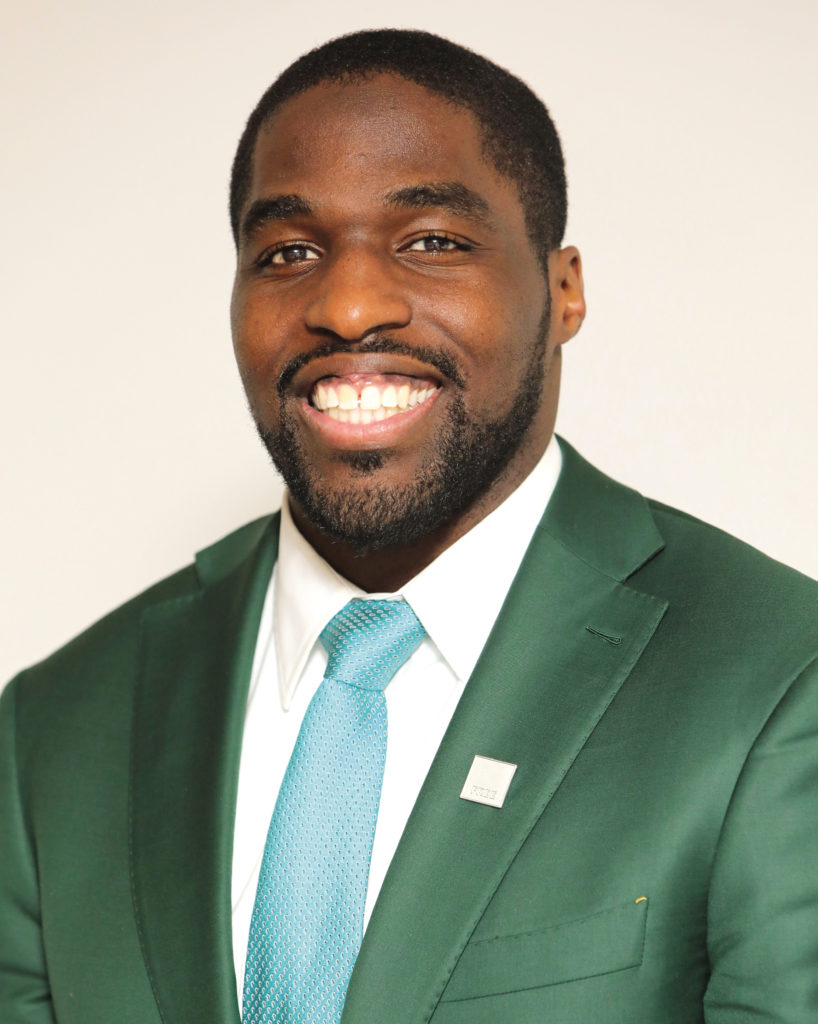
Sam Acho: My name is Sam Acho. I’m an NFL linebacker, speaker, podcaster, and also the author of the new book Let the World See You.
My parents were born and raised in Nigeria, they moved to America in their early twenties, and they started a new life and started to live the American Dream. I was born in Dallas, Texas. My dad was going to school at Dallas Theological Seminary, and he was also a pastor. And my mom was a nurse, just working and working. And now, my dad has a PhD in psychology. He’s a marriage counselor. He also pastors a church in Dallas called Living Hope Bible Fellowship Church. And then my mom went back to school after all the kids grew up and got her doctorate in nurse practitioning. So she’s a DNP now.
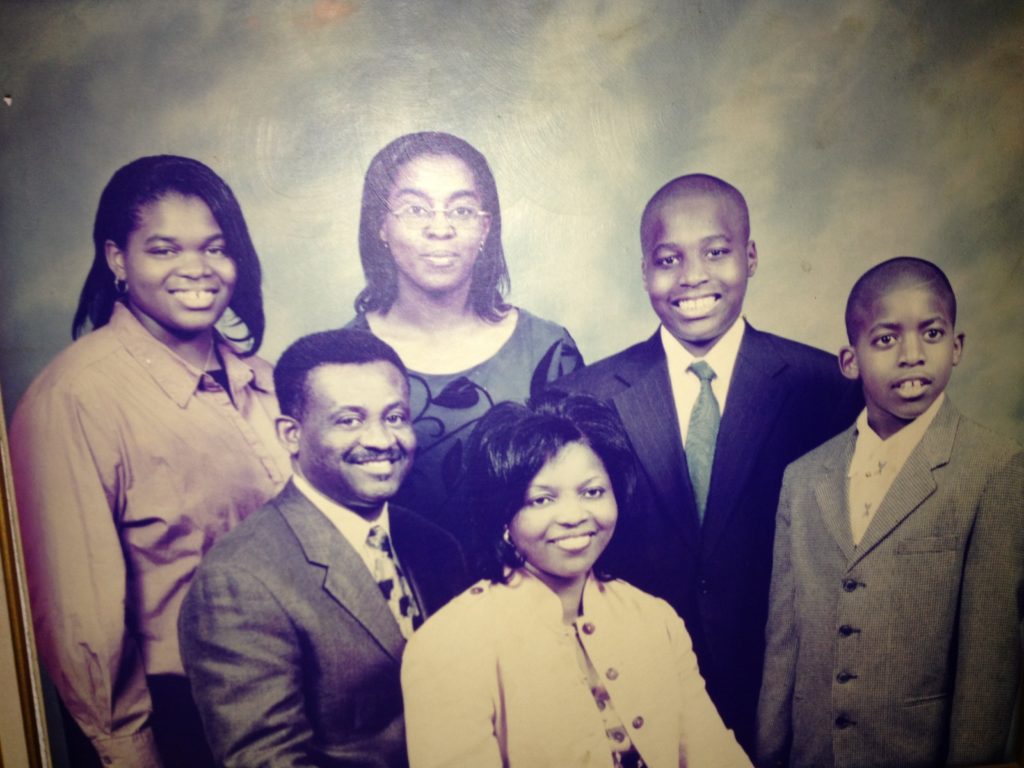
For me, growing up, I grew up in Dallas. I have two older sisters and a younger brother, played sports, went to school, loved and still love academics. Love learning, but also athletics as well. And also, like I said, going to church on Sundays and Wednesdays, really getting to know Jesus in the household.
One Door Closes, Many More Open
I didn’t know football was something I wanted to do. I was just in sports, I was playing football, basketball, track, all the different sports, baseball and just having fun. And I started getting better and better not only at football, but at basketball. And I always say, if I would have grown taller, I may have been in the NBA, but I stopped at six foot three.
And so I decided to play football. And interestingly enough, I went to a football camp my senior year. The summer before my senior year, I went to a football camp at the University of Southern California. Back then, USC was a perennial powerhouse. They had won two or three national championships in a row. They had people of the likes of Reggie Bush and Matt Leinart. Pete Carroll was the coach and we were in Texas. But my younger brother had heard about this camp in California and he said, “Hey, we should go.” So we had some family friends in California, so we decided to make it a family trip.
So we go to California over the summer and show up at this camp. What we didn’t realize was that it was an invite-only camp, and we weren’t invited. And for whatever reason, they let us in. Not only was it an invite-only camp, but the 300 best players from the state of California were all at this camp. And so I showed up, and I guess I did really well, because Coach Pete Carroll, the head coach of the team, called up me and five other guys out of that 300 up to his office and essentially offered us scholarships on the spot.
I get called up to Pete Carroll’s office. And he says, “Sam, you did a great job, really impressed. We love what we saw. Okay, well, we have another top 300 camp coming up in a couple of weeks from now. We really like you and these other guys, so we’re going to give you a call back to offer you a scholarship.”
I said “Okay, wow, thanks. Great. This is exciting.” And as I’m walking out of his door, I stop. I said, “Oh, Coach, one quick thing. You said you’re going to call in a couple of weeks. Well, in about two weeks, I go to Nigeria on this medical missions trip; so if you call and I don’t pick up, it’s not because I don’t like you it’s because I don’t have service. I’m in a rural village in Nigeria. So that’s why.”
He says, “Okay, Sam, don’t worry, we’ll be in touch.”
Growing up, I always saw my parents every summer since I was born, they would leave for two weeks to go to Nigeria. They would go and they would give free medicine and surgeries for people in need, people from rural villages who don’t have access to anything. People who don’t have light, who don’t have running water.
Well, lo and behold, two weeks later, I’m in the airport getting ready to go through security and get on the plane and my phone rings. And it’s Ken Norton Jr., who’s the recruiting coordinator at USC. “Hey, Sam, this is Ken Norton Jr. How are you doing?”
I say, “Hey, coach, I’m doing great. Thanks for calling.”
And he said, “Hey, Sam, we really like what we saw. We decided we don’t want to wait until the other top 300 camp. We want to offer you right now.”
I said, “Wait, what?”
He said, “Yes, I’ve got Coach Carroll right here, right next to me. We want you to verbally commit. All you have to do is tell Coach that, ‘I want to be a Trojan, a USC Trojan.’”
And I said, “Well, how does this work? But, but—”
“Here’s Coach.”
He gives Coach the phone. And so we kind of have a little bit of small talk, catching up, “How are you doing? How’s the family?” And after a while, Coach says, “Well, Sam, is there anything you would like to say?”
And I say, “Well, Coach, I would love the opportunity to one day think about the potential of maybe being a Trojan. Coach, I got to go, the plane’s taking off.” And I hang up the phone on Pete Carroll. Hang up the phone.
I remember getting on that flight thinking, I made the worst decision of my life. Can I call them back? What have I done? But something in my spirit wasn’t sitting well. I just felt like it wasn’t the right decision.
I go to Nigeria. As I mentioned, no service. We’re serving the people there. We come back about ten days later, and then we get off the plane. My phone just starts to just buzz, just ring off the hook. And I look and I see fifty missed calls and thirty voicemails from coaches all around the country. They found out that USC had offered me a scholarship, and also my highlight tape, it had gotten put on this recruiting website called Rivals. And so I came back from that trip and after turning down USC, every other door I could have imagined was opened.
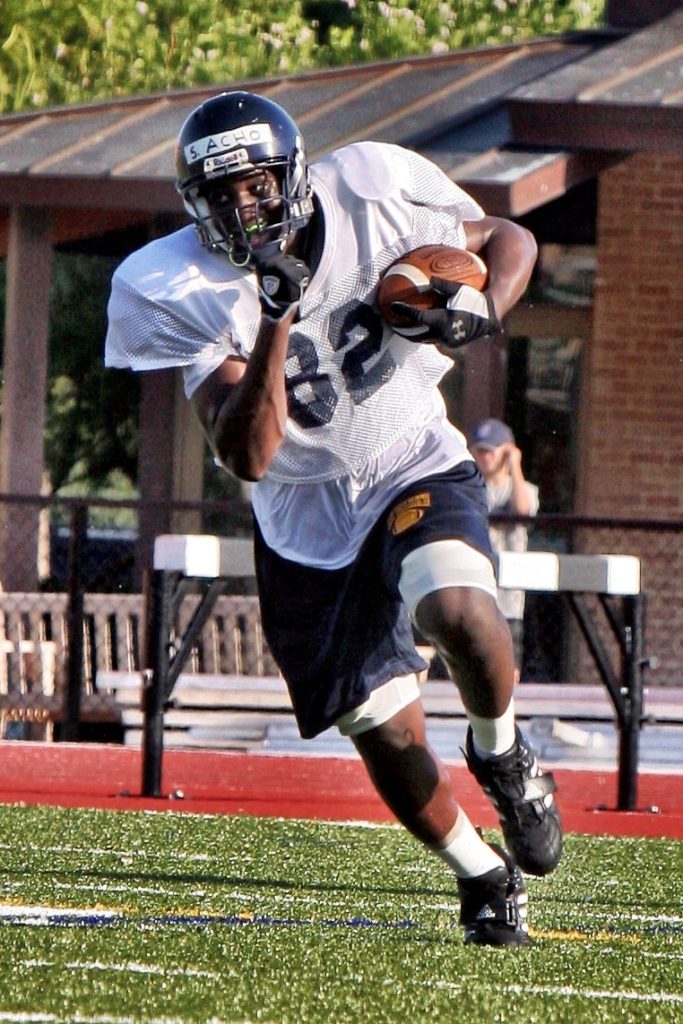
USC and many other schools want their players to commit right on the spot. “If we offer you, this offer comes with an expiration date.” That’s oftentimes the thought process. Well, for whatever reason, Texas, they hadn’t offered me up to that point. Mack Brown, the head coach at the time, was on vacation. He only gets two weeks out of the year to be on vacation. And during those two weeks, you do not call Coach Brown. And so those same two weeks was the same two weeks that I was getting calls from every coach around the country.
Finally, one of the assistant coaches called Coach Brown on his vacation. Coach picks up. He says, “Hey, this better be good.”
They say, “Coach, it is. We got a guy named Sam. You might want to look into him.”
They sent him the highlight tape. He watches it. They invite me over. I guess he cut his vacation short. They invite me over to campus. And as I walk on campus, I’m greeted not only by some of the Nigerian players on the team, guys like Brian Orakpo, who went on to be a first draft pick in the NFL and play for many years, Chris Ogbonnaya, many guys on that team who are Nigerian, but also I was met by Mack Brown and his wife, Sally. So you got to imagine it’s me, it’s my mom, it’s my dad. My younger brother came as well. It’s Mack Brown and his wife, Sally. And not only do they welcome us with open arms, but they actually apologized. “Sam, we’re sorry for taking so long. And I know many schools would want you to verbally commit. And they say you have a week or you have a month or you have a day. Sam, take as long as you need. Take as long as you need.”
And as soon as they said that, that’s when I knew that Texas was a place I needed to be.
God Thinks You’re Worth Getting to Know
One of my friends, my next door neighbor, actually, his name was Jerry Price. And he became more than a neighbor, more than a friend. He became a mentor to me. And his wife, Judy, became a mentor to my wife.
Judy and Jerry had been married for forty-some-odd years, happily married, they had kids and grandkids. They threw parties for their friends. They would hold hands, go on dates. And I wanted that. I wanted that to be me when I was sixty-five and and almost 70, like Judy and Jerry. And so he became this man who I stayed really close to and learned from.
Fast forward, I moved from my time in Arizona where he was my neighbor. I’d gone on to Chicago. I was playing with the Bears and all of a sudden, I see a message on Facebook, a post actually, a Facebook post from Jerry Price asking for permission to leave. He’d been battling cancer for years, and it wasn’t getting better. And he was ready to go see Jesus. He was ready to go home. He was about seventy years old at the time, and he knew it was his time to go.
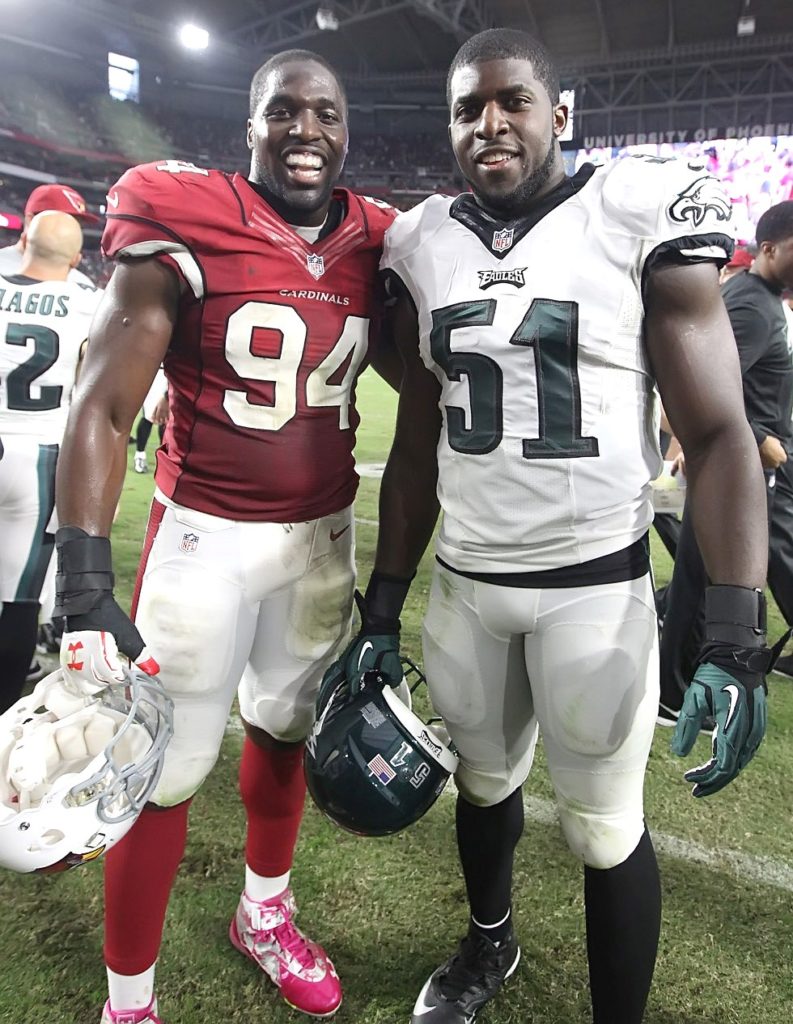
And so I called him and I was asking him, I said, “Jerry, give me what you got. I don’t know. I don’t feel like I’m in a position to give you permission, but I just need some advice. I used to always go to your house and get words of wisdom. Please share something with me. Anything that you’ve learned about me or about life, just talk to me.”
And he says, “Sam, there’s two things I want you to know.” He said, “Number one, the most important thing you can do on this earth is to get to know Jesus intimately.” He said, “God takes no greater joy than when you get to know Jesus, and you will get no greater joy in your life than getting to know Jesus intimately.”
And then he paused, and I waited and waited. “What’s next, what is the next piece of advice? What is next?”
He said, “Sam, the second thing I want you to know is that you are worth getting to know. Never forget that—you are worth getting to know.” And those would be the last words I heard from my friend Jerry. He would go on to die peacefully in his sleep a few days later. I actually flew out from where I was to go visit him, and by the time I got to him, I was moments too late.
But Jerry meant a lot to me, and I think we all have—and if we don’t have, we need—Jerry Prices in our lives, people who have gone before us, who can guide us, mentor us, teach us, advise us, be friends to us and encourage us in our times of deepest need.
Jerry’s words about getting to know Jesus and also me being worth getting to know spoke powerfully to me because we were created for relationship, we were created to love. I’ve made money, and I’ve been around people who have made money. The things that you think about acquiring, I’ve either had them or I’ve seen people who have had them. And many of those people are empty. So for this man to say that the most important thing you can do—and this man had done a lot of those things. He was in the inner circles in a lot of ways, and I think you could imagine worldly wealth or whatever you want to call it. At seventy years old, lived a full life, [for him] to say there’s nothing of greater value than getting to know Jesus? That meant something because it’s true.
“We were created for relationship, we were created to love.” – Sam Acho
God creates us for relationship, and I saw this as I was living my life. The times where I was at my best was when I was in relationship not only with others, but with Jesus, letting Him get to know me. And then also the second piece of advice of me being worth getting to know, that resonated because I don’t think a lot of people believe that they are worth getting to know. I think a lot of people think that, Well, people want to know me because of my fame, or what I can provide to them, or because of the masks that I put on, or the pretense that I put up on social media. People may want to know me because of that, but if they knew the real me, they wouldn’t want to get to know me.
And Jerry reminded me and reminded anyone listening, you are worth getting to know. Your pains, your joys, your fears, your hurts, all of you. You’re worth getting to know. Why? Because you’re already fully seen, fully known and fully loved by Jesus.
“You are worth getting to know. Your pains, your joys, your fears, your hurts, all of you. You’re worth getting to know. Why? Because you’re already fully seen, fully known and fully loved by Jesus.” – Sam Acho
Getting Rid of Fake and Getting Real
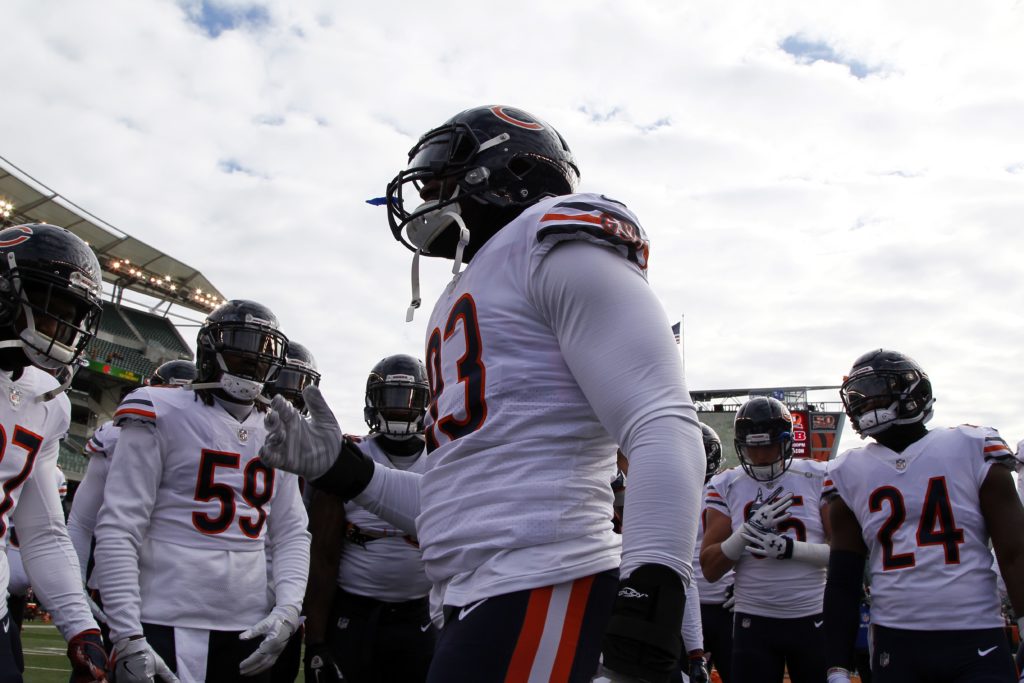
The epiphany moment for me, the moment when I realized that I was wearing the mask, was actually when I got released from the Chicago Bears. I’d never been released in my life, ever been cut, been fired from anything. I think things have been going great, and all of a sudden I remember getting released and it wasn’t the release that hurt. It was [when] I went to go say goodbye to one of one of my friends, and she’s the assistant, you know, she works up in the office. I said, “Hey, Katie, I just want to let you know that I just want to say bye. I just got released.”
And I said it with a smile, right? You know, I’m usually smiling and laughing and always got it together. And I told her that. And she did a double take, she said, “Wait, what? Hold on, say that one more time, Sam?”
I said, “Yeah, I just got released from the Bears, so I just want to say bye. Thank you for everything.”
She said, “Sam. I’m sorry. I was looking at your face as you were talking to me and you were smiling. I thought you were telling me good news. Sam, I am so sorry. I’m so sorry for your loss, that has to be devastating.”
And I realized at that moment I had been pretending. Months before, I had just signed a big contract going on my eighth year in the NFL, I was living the dream, and on the outside, things looked like they were going great. But I didn’t believe I was worth getting to know. The real me, friendships, relationships. Do you really want me because of the things that I have or you really want me because of me?
And I remember sitting down with a friend a week before training camp—this is months before I got released—and sharing with him how I was struggling and I wasn’t doing well and I felt like I wasn’t the man I was supposed to be, the husband, father, the friend, it just wasn’t me. And I remember telling him that I was just waiting for the season to start. “Man, once we get back to football, I’ll be okay. We get back to work.”
And he looked at me and he said, “Sam, if that’s how you feel right now, I’m afraid of what happens when one day football ends for you, for when you retire. I’m really concerned.”
As I’m sharing with him some of my struggles, I began to cry. And he looked at me and my tears as I was crying and didn’t judge me. He didn’t turn his back on me. He actually looked at me. He saw me and he said he said, “By the way, Sam, it’s really nice to see you.”
I’m thinking, What do you mean, “Nice to see you”?
He said, “I’ve known you for almost a decade now and I’ve never seen this side of you. It’s good to see that you’re human.”
So that was the moment, the beginning and the end of taking off the masks.
Right around this time, where everything you’re hearing about happened with me being seen and known, I stumbled upon Jesus Calling by Sarah Young. And every single day I would read it and it would really encourage and remind me, Oh wow, I am worth getting to know. Oh, Jesus does see me and know me, even in my ups and downs and the pain and the injuries, in the setbacks and being released, in not getting the playing time I wanted, in not not getting the contract I wanted, in arguments and disagreements, God still sees the best in me. So my faith in Jesus, some good people around me, and Jesus Calling the devotional got me through a really tough time.
It’s funny, for me, during that season of life, from that conversation with that friend that I just spoke of to being released, so much happened during that time, and my faith held me through. You know, anytime I sign autographs, whether on a book or on a football, I always autograph the verse Hebrews 11:1, which says that faith is the substance of things hoped for, the evidence of things not seen.
Narrator: Sam’s book, Let the World See You, is available wherever books are sold.
If you’d like to hear more stories about athletes who put their faith first, check out our interviews with Lolo Jones and Evander Holyfield.
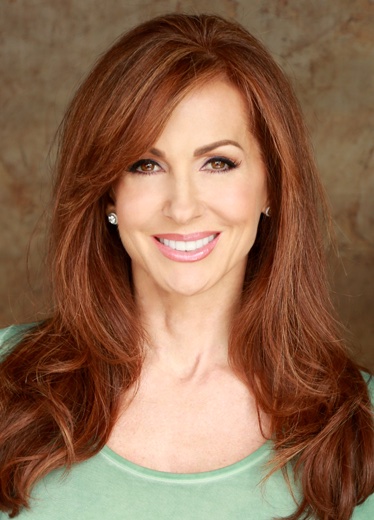
Narrator: Next time on the Jesus Calling Podcast, we speak with neurological ICU nurse and New York Times bestselling author Tana Amen. After she moved through a childhood filled with trauma and suffered with an eating disorder, Tana was determined to work her way to a life of success. But as she struggled through a painful divorce, she felt her carefully constructed facade began to crumble—and she began to spiral.
Tana Amen: I was going through this custody battle. I was a single mom. I was under so much stress, but I had to have it together. I owned my own home. I had a good job. I would paint my face every day and do my hair, and everyone thought that I had it completely together. But on the inside, I was a complete mess.
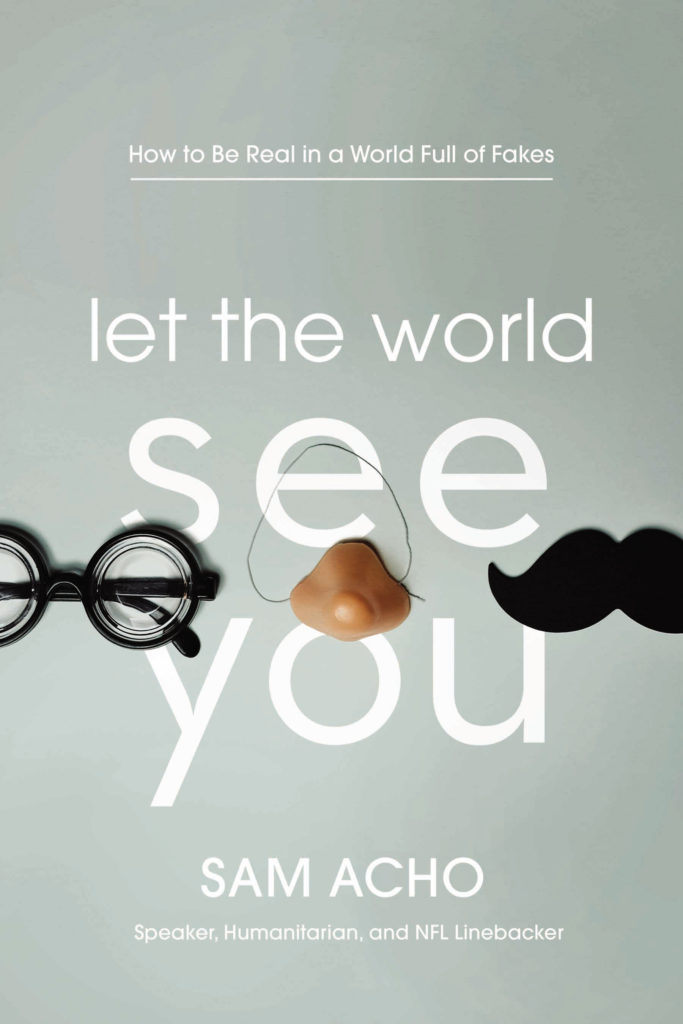
Awesome hearing about Tony and Sam’s commitment to the Christian faith!
My name is Jesse (Pancho) Cordell I have given over 5000 Jesus Calling book started in 2004 gave two last week to a nurse and a doctor .I had a text about a week ago from a guy I had given a book to 2006 he said it had changed his life he knows JESUS . There are two Bible studies with 18-20 men that read and share what the daily reading means to them.Thank GOD for the anointing on Sara Young